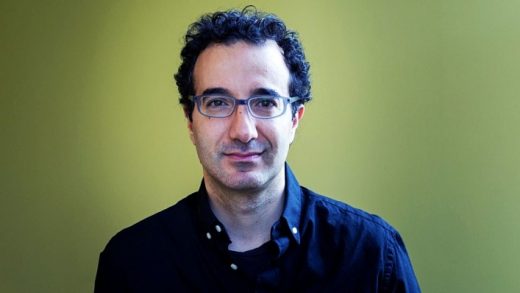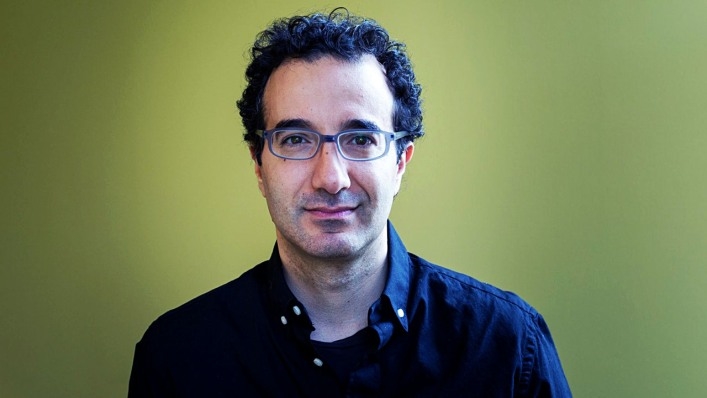Radiolab’s Jad Abumrad Hopes His Supreme Court Podcast Will Help In A “National Sh*%storm”
Radiolab ‘s spin-off More Perfect started out as a “hare-brained task,” says the show’s co-host and co-creator Jad Abumrad. In 2013 he asked his team to go look at the docket of cases in front of the U.S. Supreme Court and see if they could find a good story. One producer came back with the story of Adoptive Couple v. Baby Girl—involving an adoption under the Indian Child Welfare Act—which ended up as a Radiolab story.
“It was just a crazy thing where a teeny teeny story suddenly encompassed everything you want in a story,” says Abumrad. ” Like that sort of Whitman-esque ‘universe in a blade of grass’ thing. I remember we told the story and I thought it turned out really great and I was just like well, I need to do more stories about the Supreme Court.”
That passing thought turned into More Perfect, a six-part podcast that explored the stories and the people behind the cases that make it all the way to the highest court in the land. On Monday, More Perfect returned for a second season with more episodes and more importance. “I felt like there was an urgency behind this project from the beginning,” says Abumrad. “But now I feel like there’s an urgency to have deeper conversations about the country.”
For Abumrad, it’s not just about a good story, but about the pursuit of knowledge. “When I was growing up I never had a civics class,” explains Abumrad, “I’ve always just been really confused about the Supreme Court, like who are they, what do they do. You hear these reports on the radio and I’m like wait, what is the Commerce clause? And why is that the pivotal thing that’s determining whether I have healthcare?”
He continues, “I feel dumb and so it feels especially urgent to me right now to not be dumb.”
To learn about government and the role of the Supreme Court, Abumrad and his producers work with their legal editor, Elie Mystal, and what he describes as “a whole broad spectrum of people who are just helping us be smarter.” Through the lens of Supreme Court cases, the show takes a deep dive into obscure pockets of history, the civil rights movement, and unique individuals fighting for causes they believe in. At the root of it all is the U.S. Constitution and the members of the court tasked with interpreting it.
“It’s like the original hypertext,” says Abumrad. “It’s like one thing is connected to another is connected to another and it leads you all the way back to the beginning.”
That connection to history is important for Abumrad, because it allows him to keep current events in a broader context. “We’re in a national shitstorm right now, whatever you think about politics,” says Abumrad. “It can feel singularly crazy at this moment in time, but one of the first things that happens when you start telling these stories about Supreme Court cases is that you bring in other times and places, other people, other experiences, and you realize that shit was crazy before. Shit is always crazy! And I think that’s a really useful thought to keep in mind.”
The new season of More Perfect starts with a case that is a perfect example of that—the 1944 U.S. Supreme Court case of Korematsu v. United States. The case stems from one of the most egregious chapters in American history where the Supreme Court agreed with the government that putting Japanese Americans—American citizens— in internment camps was a legally sound way to keep the nation safe during wartime. What people may not know is that the Supreme Court found that the president’s actions were legal, and Korematsu is still law, because it has never been overturned.
On the first episode, Abumrad and producers Suzie Lechtenberg, Julia Longoria, and Jenny Lawton look at what led a young Fred Korematsu to sue the government for forcing him and his family into internment, and why he rarely talked about his role in the landmark case.
“Korematsu is the guy was the only guy who fought back,” says Abumrad. “This is a dude who’s completely and totally alone.”
The show tells the moving personal story behind Korematsu’s very public fight for justice, one that his daughter, Karen Korematsu, continues, having written a brief arguing against the Trump administration’s travel ban.
“What’s really interesting to me is the way in which this case about Japanese-Americans in a very particular time and place can be transposed over what’s happening right now in the world with Muslim Americans and Arab Americans,” says Abumrad. It’s this correlation with modern times that is particularly compelling for Abumrad, and what drives More Perfect ‘s second season. “It’s way more contemporary than last season. [These cases] are like a narrative magnifying glass on this contemporary moment that’s happening right now in America,” says Abumrad. “It’s a lot of these kinds of cases that are looking backwards in order to help us go forward.”
This season More Perfect looks at cases involving the Second Amendment, campaign financing, police brutality through the lens of Graham v Connor , and even the Commerce Clause.
“I love [that] story because it’s like the most boring collection of words, but it’s one that like takes you deep into the heart of some of the most trying civil rights moments in our history.” Turning a “boring collection of words” into a riveting, sound-rich episode is exactly what Abumrad does on his science-skewing radio show Radiolab; science, like law, can also seem like a boring collection of words, but in the hands of Radiolab’s team, it’s anything but. (For proof of this, listen to the Radiolab episode ” 60 Words,” which spends an entire enthralling hour examining the single sentence that has become the legal foundation for the “war on terror.”)
“Every story is just like some little tiny person getting their coat on, walking out of the door, and running smack into some giant existential question,” says Abumrad. “It’s great, because people expect it to be boring and it’s so not boring.” You can listen to More Perfect here.
Fast Company , Read Full Story
(57)














